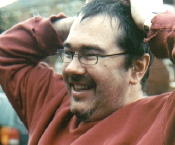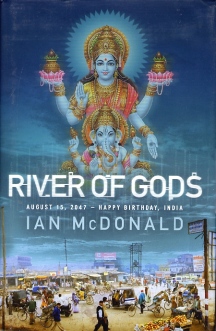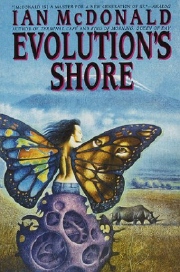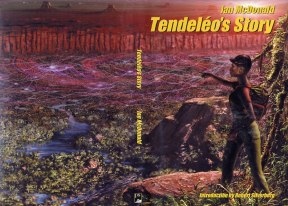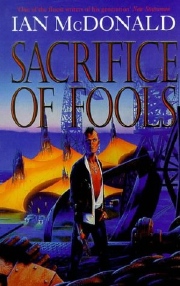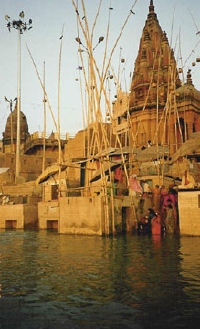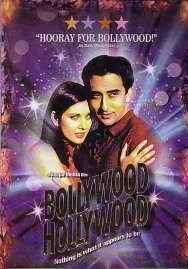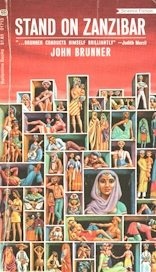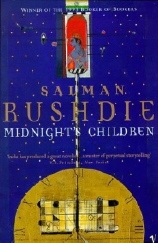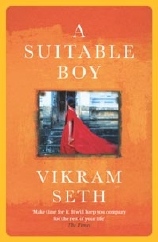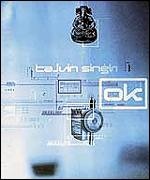From the River of Gods to
The Department of Social Services:
"The best shit job I've ever had."
The Agony Column for August 23, 2004
An Interview with Ian McDonald
The Department of Social Services:
"The best shit job I've ever had."
The Agony Column for August 23, 2004
An Interview with Ian McDonald
RK: Ian, tell me about your background -- where you were born, how you grew up -- as it relates to your fiction. IM: It's a mongrel bag -- Irish mother, Scottish father, born in Manchester but lived all my remembered life in Northern Ireland -- where such distinctions are not just a matter of life and death, they're more important than that. I went right through what's known with typical dark Ulster understatement as 'The Troubles' -- looking back now, it seems like the perfect preparation for the twenty-first century. How does it relate to my fiction? Where to end? It's certainly left me with an abiding interest in divided societies and the agonies and energies that engenders. In Belfast you're left with no doubt that you're at the very butt-end of Empire: Britain's first and last colony. J.G. Ballard is rightly regarded as the sibyl of the Imperial twilight -- he writes from the point of view of the colonizer, me from the point of view of the colony. As an outsider myself, a lot of my fiction is about outsiders -- either literally, in the case of the alien settlers in 'Sacrifice of Fools', or as main characters crossing cultural boundaries, like Gaby in the Chaga Saga, or Aj in 'River of Gods'. My characters tend to possess an underlying need to find a home, a place to root in and unfurl. But at the same time, I like the peripheries, the edges, it's where the juice mingle and the genes meld, it's where the fun is.
IM: It's this living-on-the-periphery thing again: everywhere's more or less foreign to me. We certainly have no illusions that we are the hub of the universe. It's no novelty -- science-fictionally speaking—for the mothership to land on the White House Lawn. It is if it's Uhuru Park in Nairobi -- or Ormeau Park in Belfast. And that to me makes it automatically more interesting. For the same reason that I tend to use female characters because, in our male-oriented society, a woman has always the longer and more challenging narrative journey to go on, Third World locations have a more interesting leap to make. Kenya is making the jump from Iron Age to Information Age in two generations. Eight years ago I was sharing a house with a gay Irish Republican who went dewy eyes over the economic miracle of the Celtic Tiger, when Bill Gates outsourced to Bantry. Even then I predicted it wouldn't last -- there were ten IT workers in Bangalore for every one in Bangor Co Down, better educated and probably spoke better English. Time has proved me right on that one, I think. And it's the reason why China, despite the US government's fawning to Beijing, will remain a manufacturing society: English is the second language in India. This links into the reason I set 'River of Gods' in India: the US has consistently ignored India. Think about it: how many Indians have you seen on supposedly racially-right-on Star Trek? Compared to East Asians? (Khan was Pakistani). It frankly baffles me that the US falls over itself to be nice to communist totalitarian China (let's not kid ourselves here -- capitalism doesn't need a democracy to work very nicely, thank you) and under-rates the planet's biggest democracy. (And a very enthusiastic and successful one too, apart from the few years of the Indira Gandhi 'emergency'). On this side of the Atlantic, Indian and UK culture have been closely entwined for centuries. The French rightly recognize that the best Brit food is Indian -- or rather, Indian-fusion, like Birmingham's indigenous balti. The Brit-Asian community is extraordinarily energetic and creative, evolving the way that immigrant communities have in the US, with the same interestingly ambivalent attitude to the home country. Travelling: I really can't write about real-world locations unless I've been there. With 'River of Gods', I'd had the idea back in 1999 over a lunch with my agent John Richard Parker and the legendary John Jarrold. We were talking about Kipling's 'Kim' and wondering why India was so little used as a setting for sf, and wouldn't it be great if there were an sf novel that captured that wide-screen feel of India. It all kind of snowballed from there, but I had a good skeleton of the book written before I got to go there -- if I've got one talent, it's a near-photographic memory, so I can recall something I see in extraordinary detail and try to write it down.
IM: With 'River of Gods', the story was all in place -- I knew what I was looking for, but I was careful not to let that blind me to the serendipitous. And it's the fine details that you can't get without going -- like India's strange obsession for underwear ads -- in the country, every other house and dhaba -- roadside tea-shop—has an ad for Rupa Underwear, or Titan underpants painted on the side. Or the obsession with cricket -- you may think it's a quaint English eccentricity masquerading as sport. One billion Indians beg to differ, mate. Took shitloads of photographs, met people, scribbled some notes, mostly trusted to the memory -- I didn't want to be 'doing' writing-things, because it would infect the thing of just being there and being open. Jesus, I sound like a fucking method actor there. When we were sailing down from Mirzapur to Varanasi on the Ganga, one of our boatmen -- a fourteen year-old on his first river-trip—was exactly my mental image of Yogendra, even down to the knotted pearls. RK: Any memorable research adventures?
There was the skeleton on the beach -- just downstream from Chunar Fort, on our second night on the river. She was about half a kay up the bank… a little old lady in a red sari. Jackals had been at her; the skull was a couple of metres away. She was probably a Brahmin -- they have to be buried in the sacred river, along with children, lepers, pregnant woman and people poisoned by cobras. There was nothing ghastly about it, it was just bones. She was free from the chakra wheel of incarnation. Certainly, India is an assault on the senses and sensibilities, and I suspect everyone has one moment that shocks them, no mater how liberal they think they are (I mean this in the European sense, rather than the US). I was stunned by the Dom Rajas panning the ashes of the dead for gold at Varanasi, and for sheer in-yer-face utilitarianism, the medic at the Royal Burning Ghats at Pashupatinath in Nepal: he collected corneas for transplants. The family said yes, he whipped back the sheet; worked fast with the knife, put the sheet back and the next thing you saw were two expanding circles of red where the eyes had been. He stored them in a thermos flask. We arrived in Delhi in the middle of the Cricket World Cup and the place was at fever pitch, mostly on the back of Tendulkar, their legendary batsman. We went to a great restaurant that had been themed for the Cricket World Cup -- they had the biggest LED screen I've ever seen up at the back and waiters kept spilling stuff because they were watching the cricket. In India, where there is an open patch of ground and idle males, you'll get cricket. They even play it on the rooftops of apartment blocks. Anyway, come the final -- India versus the mighty Australia—and we're heading up from Varanasi to Nepal. The streets were empty. Al India's hopes were riding on Tendulkar. Out he strode to the crease. The Ozzies bowled, he hit and was caught out for zero. And I swear I heard one billion people gasp at once. They firebombed his parent's house. Like what I said about 'it's not a mater of life and death…' Got chased by a charging rhino. Didn't meet any Maoists, which is very much the tourist thing these days… Did see a living goddess…
IM: In a sense, the bits you're looking for, you know already -- all you can get is a confirmation or a denial of a preconception. It's like that actory-thing I was saying above, it's going in with the peripheral vision open that little bit wider. Of course, with any research you throw away ninety percent of it, but you have to do it in the first place to know what bits to throw away. Something I wasn't looking for was the Kumari Devi in Kathmandu -- the child-goddess who may never bleed or touch the ground outside her palace -- inspired a spin-off story. I think what impressed me most is how completely its own place India is -- in many ways like Japan, in that its culture is ancient and strong yet absorbs influence from all around the planet and makes them altogether Indian. Hollywood doesn't stand a chance against Bollywood, even though the Mumbai movie industry is going through a crisis of faith at the moment -- there's a TV expression 'jump the shark', whenever a show, desperate for new twists, does one thing that wrecks its entire premise. It comes from 'Happy Days', when the show was so tired they had the Fonze on waterskis jump over a shark. Like Roseanne when they won the lottery, or South Park when they introduced 'Butters'. There's a sense in India that Bollywood is jumping the shark, and talk of a move towards a more realist cinema. From the country that gave us Satyajit Ray, this can only be a good thing. Also, I read recently, a move towards soap opera. Town and Country here we come! RK: When you're writing a novel with a large cast of characters like 'River of Gods', how do you go about actually creating the novel? Do you write down a plot outline, character sketches, place descriptions, or simply take notes and let the words fly where they may? IM: 'River of Gods' was five years in the planning, so there's a lot of research material… seven or eight hundred pages of notes, maps, web-site print-offs, lists, character bibles -- there's one entire character never made it to the first draft, though parts of his story ended up split between Shiv and Parvati Nandha. It's a slow process of planetary accumulation -- the idea of the book being the gravity that binds characters, incidents, background together until they achieve a coherent whole in space-time. I tend to outline the plot in advance in some detail, then block out the midlevel-structure a month in advance -- the necessary plot and character mechanics in a chapter, and then whack out the microstructure a day before, or even as I'm writing. This frees me up to think about the language and the details, rather than worrying about what's going to happen next. Writing's hard enough, anything that makes it easier is very welcome. Then again, there are always those joyous moments when you kick the whole lot off the table because you see all of a sudden what you need to do to really make it live.
IM: We in the Abrahamic tradition have trouble understanding how polytheism manages to be spiritual -- the clash between Islam and Hinduism is one of the world's big religious divides. The big breakthrough for me was understanding the difference between the concept of personal God that can be known though faith, and an impersonal divine that can be entered through practice. Hinduism is in some ways like quantum theory, anyone who says they understand it almost certainly doesn't. Part of the Indian psyche is that you're born Hindu, you can't convert. In this way it's close to Judaism and also in its non-proselytising aspect. The whole concept of Mata Bharat -- Holy Mother India -- is a manifestation of this. There is a temple in Varanasi where the central deity is a vast map of India. It's a short step to Hindutva -- nationalistic Hinduism, that equates the two. But then, again, that is a simplification -- it's very hard to make absolute statements in Hinduism. I've been to fire ceremonies by the banks of the Ganga, and the actual Kali temple where Vishram's father retreats, and there were quite distinct, very different spiritual experiences. Sailing down the Ganga, I met a fair number of Brahmins who would come a dawn to bathe in the river. I'm always wary of equating post-singularity Artificial Intelligence too closely with 'god' (I argue in the book that we are gods to each other) -- artificial intelligence is alien intelligence, as I hope I reason—but the Hindu system of manifestations and incarnations and avatars and aspects seemed to be a perfect way of building a Generation Thre Aeai -- rather than the lesser unfolding out of the Absolute Atman, Atman accumulates from the meshing complexities of the lower level entities. The Hindu concept of demons intrigued me, because there was none of the Abrahamic concept of 'sin' and imperfection -- the Rakshasas and other demons are just the opponents of the Gods. Morally, the Gods are little better than the demons; they're just as likely to raze humanity with divine fire. It's like football: To a Manchester United fan, Arsenal are only evil because they are opposed to Man U: they play the same game, with similar powers and talents and characters and rules. So I don't have any real villains in 'River of Gods' -- or in any of my books, because I have trouble with this concept of 'evil'. Islam in India is a very interesting religion: Sufism is strong, and growing, and I hope that in India it may achieve the same tolerance, social sense and fostering of the arts as Islam did in Saffayid Spain. RK: River of Gods is an ambitious novel that uses characters to evoke a number of science fictional themes. What brought the story of the Tal and the nutes into focus? IM: The conceit of a third sex fitted in with the almost Darwinian pressure of future-Indian marriage: some would always think it better not even to get into that. Then I bought a book on the art and imagery of Kali, one of whose manifestations is Ardhanarisvara, the woman/man divided, and it seemed to confirm the notion I had to make Tal a central character. Cheryl Morgan has given me a consistent hard time about bad things happening to people who differ from the sexual majority in my books -- something I've thought long and hard about. Yes, bad things do happen to Tal, yts bait in a honey-trap, but yts not prepared to be the victim, to allow these things to be done to yt, and yt takes charge and wants to know what the hell is going on. In the background, Hijras -- traditional eunuchs -- have an important and ancient role in North India -- we met some at the elephant festival in Jaipur—but they live as women, and are very closely constrained. Even though much of its iconography resonates well with gay culture -- particularly in the UK -- India is very homophobic -- the only area with any gay culture is, unsurprisingly, Mumbai. I wanted to use the nutes to explore another aspect of future Indian sexual politics, and the ubiquitous concept of caste. I think the idea in the back of my mind was, between the nutes and Capital 'B' Brahmins, you could have a physical underpinning of a new caste system. RK: Given India's current technological prowess, it's not surprising that you weave in themes traditionally associated with the cyberpunk subgenre. How do you manage to do this and end up with a work that isn't limited by this choice?
RK: This book has taken at least three years to finish. How do you maintain interest in the work and keep your writing alive and fresh when writing a work this long, this complex and this time-consuming? IM: Longer than three years, man. I have a day job as head of development for a factual TV company. Factual TV eats information and ideas -- and you can't be too fond of your little darlings. Across the industry, the average hit rate in 2%. But it does expose you to a blizzard of raw feedstock and people: for me, there isn't a point where writing ends and television begins: there's a continuity of inspiration: some ideas have crossed from one manifestation to another. Alterre in 'River of Gods' began as a UK Channel 4 school idea that they liked but couldn't get the money for. I had the idea of Shiv as an organ runner -- we pitched an idea of UK Channel Five: give Donal MacIntyre (as well known UK investigative reporter) £1 million and see if he can buy an entire village of kidneys out in India (did it for a lot less than that). That screened last year. Nothing's ever lost… it's a food chain. In terms of actual writing, I aspired to two pages a day (like Petrocelli and his seven bricks, which shows my age). Of course, it never quite lived up to that, but it was reasonable. Half the battle of writing is getting into the mindset of writing, so I never found it to hard to pick up, because I'd never got to the position where I'd written ahead of myself and didn't know where story and characters were going. RK: For all the complexities of character, plot and setting, your prose in River of Gods is also quite complex and beautiful. What are the origins of your prose style, and how is it modified and influenced by the plot, setting and characters in River of Gods? IM: One of the first issues I deal with in a book or story is its voice: tense, language structure, rhythm. Present tense seemed to give it the necessary crammed, all-at-once sense I wanted. I also wanted to celebrate the joys of 'Hinglish' (as she is known) without getting too 'goodness gracious me.' Certainly, no matter how good the accent, I can always tell when I've been put through to a Bangalore call center when they ask me: 'how are you spelling that?' In many ways, Hinglish is quite like Irish English, full of quaint archaisms and a love of a good, mouth-filling phrase.
IM: I've been reading the Indian and Brit-Asian writers for years -- they've historically featured much more prominently in UK literature for the reasons I mention a couple of questions back. All fiction is a dialogue with itself, so I self-consciously remixed elements from Midnight's Children and the breadth of scale of A Suitable Boy. The other great conscious sample is, of course, Stand on Zanzibar. And of course, always, everywhere, Blake. But he's not Indian, though he embraced Hindu concepts in his spirituality. RK: For all your acclaim, your awards and your obvious skill, you're currently unpublished in the United States. Does the fact that you're not being published here change the fiction you write -- for example, do you give yourself more room to roam since you won't have to try to sell your work to the cereal-box reading group? IM: In a sense, having a day-job is the twentieth century equivalent of an eighteenth-century patron of the arts: it frees you from having to write the roof over your head. It certainly frees me to write the books I want to write, and spend the time it takes to get the feel, the tack, the smell. I've always had a reputation for not being 'easy', -- particularly for this book—but then again, that's part of the way I wanted to convey India: it is an assault on mind, body and spirit and I feel any book about it that claims to be an 'easy read' is selling its subject short. Another thing the day-job frees me from is the fear that some day I might have to do a Star Trek novel. I was going to say I've nothing against Star Trek, but actually, I do, even though I enjoyed DS9 a lot. (But their space battles weren't as sheerly heavy metal as Bab Five's). I do think it has deformed, not so much the genre, as the type of stories and characters we can tell, and how we tell them. It's not the kind of writing I'd want to do, basically. I did once choose a job opening post in the Department of Social Services rather than write a Star Trek novel -- best shit job I ever had. Great people, great money, great hours, and real. It got me out of what Steve Baxter once called 'white room syndrome', and anyone who's ever written anything knows what that is. RK: Since you are so clearly skilled at writing huge, satisfying novels, how would you go about marketing your books in the States if you were given the opportunity to do so? IM: The full-bling tour with Lear and stretch would be nice. Haven't given it thought… RK: Can you tell my readers what's next for you? We won't have to wait three years, will we? IM: Brasil. Even though Charles DeGaulle once dismissed it in the words 'Brazil is not a serious country', you don't shrug away the planet's fifth biggest country. This is one of the world's greatest and strangest countries: it's murder rate fits the UN parameters for a low-grade civil war. Yet it and its people have so many selves, so many aspects and identities, all flowing into each other. It's passionate, physical, seductive and has one of the most brutal histories you can imagine: much of Ursula LeGuin's lovely Four Ways to Forgiveness could be drawn straight from Brazilian history. Like India, it's entirely it's own place. Odd: I seem to do sf about places that grow coffee… In the meantime, I'm trying to sell a mainstream novel 'Hopeland' (any Sigur Ros fans out there?) -- which is a family saga for the 21st century, in that the family is spread across space rather than time—I allude to it in 'River of Gods', with Marianna Fusco and her constellation family, these scattered individuals who are all connected in a complex web of relationships. RK: Your novel comes with a pretty intriguing suggested soundtrack. Can you tell us the part that music plays in your writing, research and composition? Do you listen to music when you read, and if so, what music has accompanied your most recent reading and what sort of music is likely to get chosen?
I have sometimes consciously written pieces to try to evoke the same sense as a piece of music: the opening section of Chaga/Evolution's Shore (and the close of Kirinya) were written to the opening and closing sections of John Tavener's The Protecting Veil: a huge sense of wide-scale, twilit serenity. I can still smell the salt-scrub when I hear it. We had a German girl staying with us last year as I was putting the final section of the book together and I drove her berserk playing Godspeed You! Black Emperor's Motherfucker/Redeemer over and over at foundation shaking volumes as I did the scene where Mr Nandha finally hunts down Aj. And, like Al Reynolds, there are always lot of little rock allusions and jokes in the text… One of the great gifts of this age is, like Tal, you can put a soundtrack together for everything. But the real reason is: if you list your essential soundtrack, you can claim your music collection against tax. |
